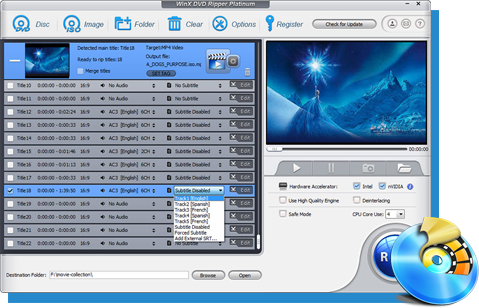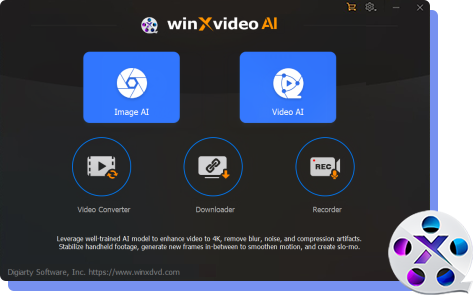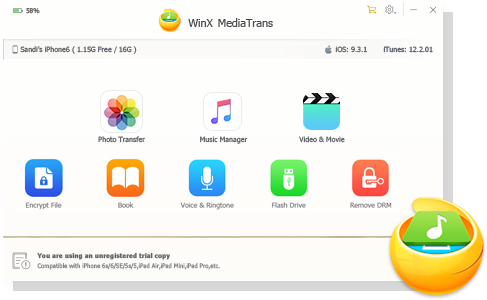What are the DVD Advantages and Disadvantages
Though many of us today rely on various streaming services instead of physical media, and yes, the streaming revenues have surpassed DVD sales for years, DVD still plays an important role. For example, the Star Wars: The Rise of Skywalker DVD movie gains 1.9 million dollars a week. Those DVD rental kiosks at the 7-Eleven are still popular. Why are DVDs still around? Let's start with the DVD advantages and disadvantages.

Table of Contents
Part 1. What is DVD?
A DVD, or Digital Versatile Disc, is a type of optical disc. It was introduced in the late 1990s as a successor to VHS tapes and quickly became the dominant format for home entertainment and data storage. DVDs are compatible with a wide range of devices, including DVD players, computers, gaming consoles, and portable media players. They can be played on both standalone DVD players and DVD drives found in computers and other devices.
DVDs are made of polycarbonate plastic, with a reflective layer containing the digital data. They are typically 12 centimeters (4.7 inches) in diameter and have a standard thickness of 1.2 millimeters. DVDs have a significant advantage over CD with higher storage capacity. A standard single-layer DVD can typically hold around 4.7 gigabytes (GB) of data, while dual-layer DVDs can hold up to 8.5 GB.
DVDs are commonly used for storing and playing digital video content, including movies, TV shows, and other video recordings. They support various video formats and codecs. DVDs can also store digital audio content, including music albums, audiobooks, and other audio recordings. They support audio formats such as Dolby Digital and DTS. In addition, DVDs can be used for storing data files, software programs, and other digital information. They are often used for distributing software, games, and multimedia content.
Part 2. List of DVD Advantages and Disadvantages
DVD Strengths
Large storage capacity: The DVD capacity size ranges from 1.4GB to 17GB. In other words, a DVD with one layer can hold up to 2 hours of high-quality video and audio, with 8 audio tracks, 9 video angles, 32 subtitles, menus, etc. in one disc. And a recordable Blu-ray disc with four data layers can hold up to 128GB data.
DVDs are cheap: Considering the massive DVD popularity for years, you can easily get low-priced DVDs from every store. Compared to other storage options like USB and Cloud services, optical storages are cheap for its capacity size.
Good quality: Though DVDs offer lower resolution at 480P only, it's a superior quality of sound and video output suitable for storage of contents that require large storage capacity. The Blu-ray discs are capable to deliver 4K resolution.
Long DVD durability: How long can a DVD last? If stored properly, the DVD discs have a life expectancy of 20 to 200 years.
DVD Disadvantages
A DVD drive is required: One of the biggest DVD limitations is the must of a DVD drive to play a DVD. However, nowadays, more and more hardware is released without a DVD drive.
Hard to change the data: Unlike a USB or hard drive, you can't insert the disc and start to make changes. Burning software is required to write new data to a rewritable disc.
DVDs are cumbersome: If you want to bring couple of DVD movies to your trip, be prepared, it can be exhausting. It's also a headache for movie fans to make room for piles of their DVD collections.
DVDs are fragile: DVDs are too vulnerable to stand a small scratch. If you don't keep them carefully, your kids can easily make them unplayable.
DVDs are DRM-protected: DVDs contain built-in protection and region codes to prevent illegal copy which may cause troubles sometimes. For example, you have to remove the region code in order to play a UK DVD in the US.
Poor support on HDTV: Watching a DVD on a HDTV or 4K UHD TV is painful. TDVD videos can only support 480P and its picture will be pixelated when playing a DVD on a larger screen. Even a upcaling DVD player won't make the DVD look spectacular on 4K TV.
Part 3. Pros and Cons of DVD vs Streaming: Why are DVDs still around?
With Netflix, Hulu, Disney+, Amazon, and so many streaming services constantly feeding high-quality movies and TV shows, one may ask, why do people still buy DVDs? Compared to streaming services, do DVDs have any advantages?
Ownership
After you subscribe to a certain streaming service, it allows you to access to the movies and other media it provides. You don't actually own it. The providers can remove them whenever they want without asking your opinion. DVDs give you a sense of ownership of the movie. Plus, hardcore fans of any franchise or series will always want to own a hard copy of their beloved content.
Reliable quality
When everybody is home at night or on the weekend, getting a good quality stream during the prime-time is difficult. Having the optical discs in your hands means you never experience buffering. More than that, the streaming content almost always suffer from compression for more efficient transfer over the internet. Therefore, the quality of video streams is nowhere near the image and 5.1-channel sound of Blu-ray discs. Even DVDs look better than streams after upscaling.
Extras
Another major DVD advantage over most streaming services is that DVDs often contains a range of special features not available in their digital counterparts. As a key selling point, there are deleted scenes, outtakes, special documentary, exclusive interviews, the Easter egg, posters, etc. For fans, they would still buy DVDs for these extras.
If you're interested, here is a detailed review on streaming vs DVD pros & cons >>
Though the DVD popularity is beyond doubt, the existing DVD disadvantages are still a big drawback compared to streaming. The big DVD size and the must of disk drive place a big challenge for DVD collectors. But these limitations can be removed with DVD ripping software. For example, with a program like WinX DVD Ripper, you can convert your old, new, homemade, legally-bought DVDs to any digital format like MP4 or H.264. Then you can play the converted DVD movie on TVs, mobiles, tablets, any devices without having a disk drive.
( Free download Windows version or
Free download Windows version or  Free download macOS version)
Free download macOS version)
Part 4. The Future of DVDs
According to our view, DVDs will still be around for years. Why?
Since 2008, DVD sales have declined by more than 86% in 13 years. Despite the downward trend, physical media sales still remain strong. Streaming services require a fast and reliable internet connection, but plenty of people in this country (and others) barely have Internet at all. The DVD advantage of not requiring the internet makes it an option for many people. Before everywhere has reliable fast Internet and no data caps, people will still buy DVDs.
More than that, an important advantage of DVDs and Blu-rays is that they can offer 4K resolution, which outperforms the common streaming resolution standard 1080p. Blu-ray discs and DVDs are still around because they come packed with more information than HD streaming, which will give you more control over factors such as contrast and color.
However, with smartphones and other portable devices become more and more popular, many hardware manufacturers decided not to include an optical drive anymore, such as Apple and Dell. The future of DVDs is bleak for sure. We believe that DVDs are phased out, but it's a long-drawn-out process. You can continue buying DVD movies, but you'd better create a digital copy of your DVDs for any future changes.
Back up DVDs for Future Playback Everywhere
WinX DVD Ripper - Back up DVDs to MP4, H.264, MOV, AVI, WMV, 350+ formats for iPhone, Android, Plex, TV, any device. Support any DVDs you have, including home-burned DVDs, store-bought movies, old DVD collections, etc. Convert a DVD in 5 minutes! Extremely easy to use for users of any age.

















